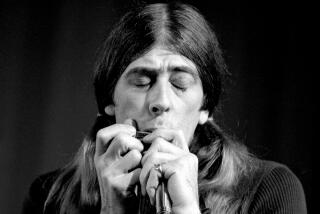Paul Butterfield, Blues Innovator in Rock Music, Dies
- Share via
Paul Butterfield, a harmonica player who played a leading role in popularizing the blues with rock audiences in the 1960s, was found dead early Monday in his North Hollywood apartment, the Los Angeles County coroner’s office said. He was 44.
Coroner’s spokesman Bill Gold said there “was no apparent cause of death” and that an autopsy would be performed. The body, clad in street clothes, was found in the kitchen of the apartment by Butterfield’s manager, Jesse Turajskt, Gold said.
“Butterfield was certainly one of the pivotal figures in raising the consciousness of blues in what was a white-dominated ‘60s rock world, and also helped make the idea of a white musician playing the blues credible,” Times pop music critic Robert Hilburn said.
Butterfield, who first studied classical flute and then mastered the harmonica by the age of 16, grew up on Chicago’s predominantly black South Side. There, he was one of the first young white musicians to venture into black blues clubs where he played with Howlin’ Wolf, Buddy Guy and Little Walter, all black blues stars.
Later, at the University of Chicago, Butterfield met Elvin Bishop, another harmonica player, and in the early 1960s, the two formed the Butterfield Blues Band, consisting of Butterfield, Bishop, lead guitarist Mike Bloomfield, another guitarist, a piano player and a drummer. The six musicians became popular around Chicago and aroused considerable interest among blues musicians because of their use of amplification and material which combined elements of the blues, folk, rock and jazz.
The band recorded two high-energy blues albums for Elektra Records which, according to music reviews of the time, paved the way for British blues groups that surfaced in the rock world in the late 1960s.
Although organizers of the 1965 Newport Folk Festival ruled out amplified instruments, they relaxed the rule for Butterfield’s group. The band then proceeded to back folk singer Bob Dylan, who outraged folk song purists by performing with the group. After that, Dylan made his controversial move into electrified rock music.
After Newport, the group, adding a brass section, toured widely both in and outside the United States while Butterfield continued to experiment with music until 1972. He then switched to an acoustic-electric lineup with a group called Better Days which toured and recorded until health problems curtailed Butterfield’s activity.
Butterfield moved to Los Angeles from New York early last year and was involved in various recording projects, including his first record album in five years, “The Legendary Paul Butterfield Rides Again.”
More to Read
The biggest entertainment stories
Get our big stories about Hollywood, film, television, music, arts, culture and more right in your inbox as soon as they publish.
You may occasionally receive promotional content from the Los Angeles Times.










